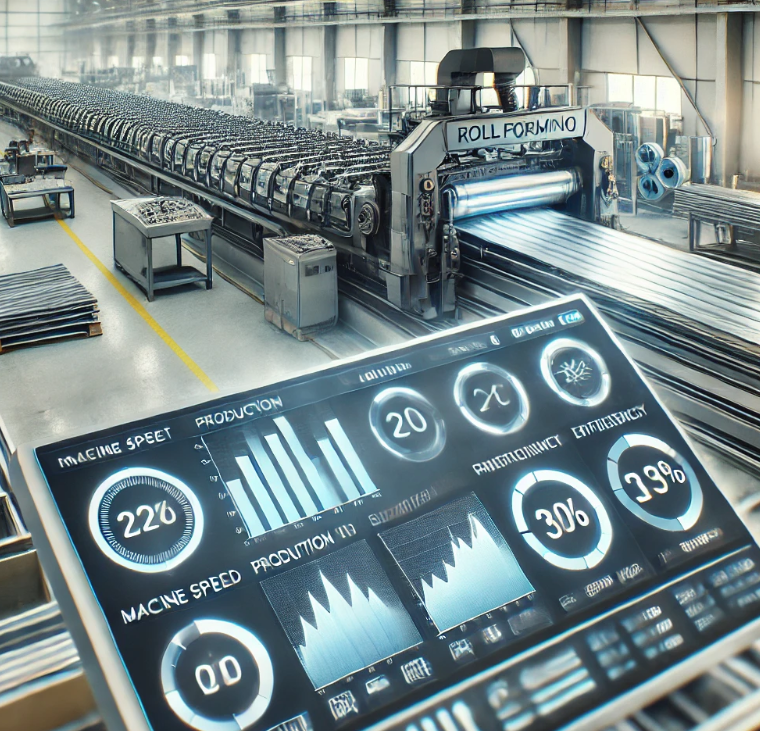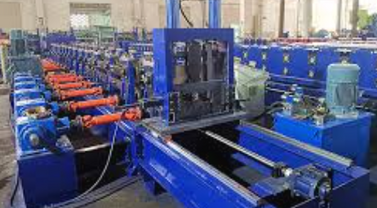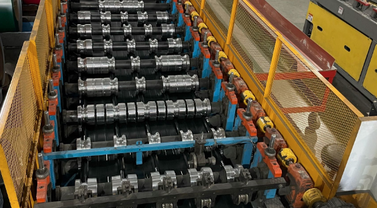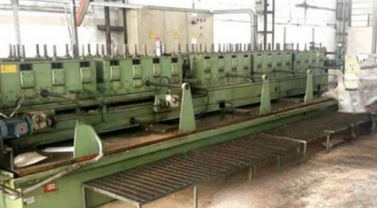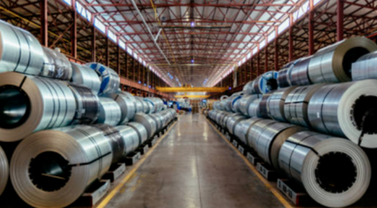These systems can help streamline operations, track production data, and improve efficiency. Here are a few types of software and key features you might consider:
1. MES (Manufacturing Execution Systems) for Roll Forming Machines
- Production Scheduling: Helps in planning and scheduling production runs based on order priority, machine capacity, and material availability.
- Real-time Monitoring: Tracks machine performance, downtime, and production status in real-time, ensuring optimal machine utilization.
- Quality Control: Integrates with quality management systems to log quality metrics and reduce scrap or rework.
2. ERP (Enterprise Resource Planning) with Manufacturing Modules
- Inventory Management: Tracks raw material and finished goods inventory, ensuring efficient stock control.
- Order Management: Automates order tracking from customer order entry to production and delivery.
- Production Costing: Tracks labor, materials, and machine time to provide detailed cost analysis.
3. SCADA (Supervisory Control and Data Acquisition) for Roll Forming Machines
- Machine Automation and Control: Provides a centralized platform to control and monitor roll forming machines and their parameters (speed, temperature, tension, etc.).
- Data Logging: Logs production data for analysis and reporting, allowing you to monitor trends and optimize performance.
4. Custom Solutions Specific to Roll Forming
- CAD Integration: For custom roll forming designs, some software integrates with CAD systems to automatically generate production-ready files and reduce errors in design to production transition.
- Tooling Management: Tracks the use and condition of tools like dies, rollers, and cutters, ensuring timely maintenance or replacement.
Popular Options:
- JobBOSS or Global Shop Solutions: ERP systems with strong manufacturing capabilities, including shop floor management for roll forming.
- Epicor and NetSuite: ERP systems that can handle inventory, production, and scheduling specific to roll forming processes.
- FASTSUITE Edition 2: A software solution that integrates CAD/CAM with roll forming machines to improve design and production efficiency.
To help you explore the best production management software for your roll forming machine needs, I'll break down a few solutions in more detail that might suit various aspects of your operations, such as production control, inventory management, and quality assurance.
1. JobBOSS
- Key Features:
- Shop Floor Control: Provides visibility into production scheduling, job tracking, and machine utilization.
- Inventory and Material Management: Real-time tracking of raw materials and finished goods, ensuring that materials are available for production runs.
- Cost Control: Breaks down job costing, including machine time, labor, and materials.
- Real-time Data: Tracks shop floor performance and provides data to improve production efficiency.
- Why It’s Good for Roll Forming: JobBOSS is well-suited for custom manufacturing environments like roll forming, where flexibility and tight control over job progress are important.
2. Epicor Kinetic
- Key Features:
- Manufacturing Execution System (MES): Offers real-time data on machine and operator performance, allowing for better scheduling and capacity planning.
- Advanced Scheduling: Helps optimize production flow by aligning production schedules with available machine time and inventory.
- Quality Management: Built-in modules for tracking and improving product quality.
- Integration with CAD/CAM: Allows seamless integration with design tools, making it easier to move from design to production for custom roll forming profiles.
- Why It’s Good for Roll Forming: Epicor’s advanced features in real-time monitoring, scheduling, and material tracking make it highly beneficial for optimizing roll forming operations.
3. Global Shop Solutions
- Key Features:
- Complete ERP Suite: Combines CRM, inventory management, order processing, and shop floor management in a single platform.
- Material Requirements Planning (MRP): Helps forecast demand and aligns inventory and production accordingly.
- Production Control and Scheduling: Features shop floor scheduling and machine tracking capabilities to ensure optimal machine usage.
- Quality Assurance: Tracks production quality and integrates with inspection systems to ensure compliance with quality standards.
- Why It’s Good for Roll Forming: It’s a comprehensive solution with strong manufacturing-specific features, making it ideal for controlling the entire production lifecycle of a roll forming operation.
4. FASTSUITE Edition 2
- Key Features:
- Design to Manufacturing Integration: Enables direct integration of CAD designs to production, streamlining the roll forming setup process.
- Tool Path Optimization: For complex roll forming profiles, the software automatically calculates and optimizes the tool paths, reducing setup time.
- Real-time Production Monitoring: Tracks production data and machine performance, ensuring smooth operation and immediate response to any issues.
- Why It’s Good for Roll Forming: FASTSUITE excels at handling custom roll forming profiles and designs, which can be directly imported from CAD software for production, reducing lead time and errors.
5. NetSuite Manufacturing
- Key Features:
- Cloud-Based ERP: Provides comprehensive cloud-based solutions for inventory, order management, and production control.
- Production Planning and Scheduling: Helps you align machine schedules with raw material availability and customer demand.
- Work Order Management: Tracks work orders from start to finish, ensuring that production is running according to plan.
- Cost Management: Helps track and analyze the costs associated with production, including labor, material, and overhead.
- Why It’s Good for Roll Forming: Being cloud-based, NetSuite allows for real-time visibility and control over multiple production sites, which is ideal if your roll forming operations are spread across different locations.
Considerations When Choosing Software:
- Customization Needs: Some systems are more flexible for custom manufacturing, like FASTSUITE and Epicor, which are good for handling unique designs and roll forming profiles.
- Cloud vs On-Premise: Systems like NetSuite are cloud-based, which can provide easier access and lower upfront costs. However, for more sensitive data and control, on-premise solutions like JobBOSS may be preferred.
- Integration: Ensure the software integrates with your existing systems (e.g., CAD, MRP, quality control systems).
- Scalability: Choose software that can scale with your business as you add more machines or expand production capacity.
1. JobBOSS
- Pricing:
- Pricing for JobBOSS varies depending on the number of users and modules you need. It typically follows a subscription-based model for cloud versions or a one-time license fee for on-premise versions.
- The cost can range from $5,000 to $25,000 annually, depending on the size and complexity of the operation.
- Implementation Time:
- JobBOSS implementation usually takes 1-3 months, depending on the customization and complexity of your setup.
- Training and integration services may come as an additional cost but help with a smoother transition.
- Features to Highlight for Roll Forming:
- Real-time production tracking.
- Job costing and scheduling tailored for metal forming industries.
- Strong support for inventory and material management.
2. Epicor Kinetic
- Pricing:
- Epicor pricing is based on the modules you choose (MES, ERP, etc.), the number of users, and whether you select cloud or on-premise deployment.
- Pricing typically starts around $100 per user per month for cloud-based systems. Implementation can vary between $10,000 and $100,000 depending on the complexity.
- Implementation Time:
- A full Epicor implementation usually takes 4-6 months, especially if you are integrating various modules (e.g., inventory, production, quality control).
- Epicor provides a comprehensive support structure for training, setup, and customizations.
- Features to Highlight for Roll Forming:
- Advanced production scheduling.
- Real-time machine data monitoring.
- Strong quality management integration to reduce scrap and rework.
3. Global Shop Solutions
- Pricing:
- Global Shop Solutions is an all-in-one ERP that typically charges based on user count and the modules required.
- Typical pricing starts from $10,000 for smaller operations, with larger companies paying upwards of $50,000 annually.
- Implementation Time:
- Implementation time averages between 3-6 months, depending on how many modules (CRM, production, scheduling) you plan to deploy.
- Features to Highlight for Roll Forming:
- Integrated quality control and inventory management systems.
- Robust shop floor data collection tools to track real-time production data.
- Flexible customization options for the metal fabrication industry.
4. FASTSUITE Edition 2
- Pricing:
- This is a specialized CAD/CAM and production software. Pricing can be highly variable based on the extent of the customization needed.
- For a single machine integration, pricing starts around $20,000 for the base package, but custom integrations and additional tools (for complex profiles) can increase this cost.
- Implementation Time:
- Implementation could take 2-4 months, depending on the complexity of the roll forming machine and integration with CAD/CAM tools.
- FASTSUITE offers tailored support, including integration services and training.
- Features to Highlight for Roll Forming:
- Direct integration from CAD to machine tooling.
- Optimization of machine parameters for custom profiles, which reduces errors in design-to-production.
- Detailed data logging for quality assurance and performance monitoring.
5. NetSuite Manufacturing
- Pricing:
- NetSuite typically charges on a per-user basis, with pricing starting around $99 per user per month for the basic ERP package. For manufacturing-specific modules, the cost can rise to around $300 per user per month.
- Total costs can range from $10,000 to $100,000 annually, depending on the size and the number of modules implemented.
- Implementation Time:
- Cloud-based solutions like NetSuite tend to be faster to implement. Typical deployments take 3-6 months.
- NetSuite offers extensive training and support for implementation and integration.
- Features to Highlight for Roll Forming:
- Cloud-based system allows for real-time data access from anywhere.
- Advanced inventory and supply chain management to ensure raw materials are aligned with production schedules.
- Work order tracking for streamlined production.
Key Questions to Consider:
- Size and Complexity: Are you managing a single machine, or are you running a full-scale operation with multiple machines and production lines? Larger operations will benefit from ERP systems like Epicor or NetSuite, while smaller setups may prefer JobBOSS or FASTSUITE.
- Cloud vs On-Premise: Cloud-based solutions like NetSuite and Epicor offer easier access and scalability, but on-premise options like JobBOSS may be better if you prefer more control over your data.
- Integration Needs: Do you need to integrate with CAD software for custom roll forming profiles? If so, solutions like FASTSUITE that offer CAD/CAM integration would be ideal.
- Budget: Larger systems like Epicor and NetSuite may require a higher upfront investment but could offer long-term scalability and more advanced features, while JobBOSS and Global Shop Solutions may be more cost-effective for smaller operations.
